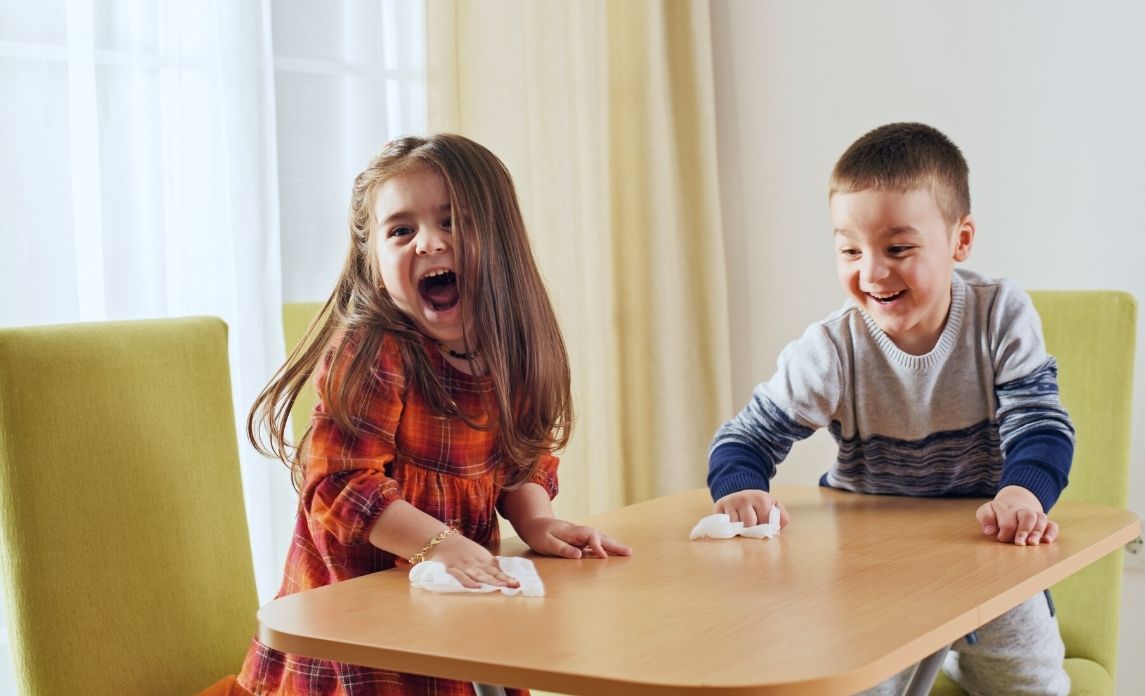When it comes to children’s education, it’s not enough that they know how to read, write, and count. It’s also important to teach them how to do chores like cleaning the house. While you—both teachers and parents alike—should definitely let “kids be kids,” you should also appreciate that learning how to clean the house has plenty of benefits. These include
- learning life skills at an early age
- learning the importance of responsibility
- building self-confidence and a strong work ethic
- reinforcing respect
- discovering smart ways to work
That said, it can be difficult to determine when it’s actually a good time to let kids start helping out. There may be times when you feel like they’re just getting in the way rather than actually getting things done and appreciating their tasks.
The Earlier, the Better
The best thing to remember about teaching kids about household chores is, the earlier, the better. This helps encourage the behaviour of helping and underscore that everyone needs to contribute around the house.
For the best results, make sure to delegate age-appropriate tasks. Here are some examples:
- Ages 2 to 4: picking up toys, putting trash in the bin, placing dirty clothes in the hamper
- Ages 5 to 7: making the bed, sorting clothes before and after washing, clearing the table
- Ages 7 to 10: helping with meal preparations, sweeping the floor, washing dishes
For younger kids, it’s best to talk to them while you’re doing the tasks to help with thought processing.
Lead by Example
Most of the time, young children copy what adults do. Thus, if you want them to clean up after themselves, you should do the same. Get in the habit, especially for smaller tasks like putting things back where you got them from.
For daycares and other educational institutions, hire professional cleaners to keep things spick and span. If children have an idea about what “clean” looks like and get used to it, they’re more likely to emulate it at home and for themselves.
Simple, Positive Language Makes a Difference
Admittedly, chores can be boring. Sometimes, they can also be exhausting. But there’s no getting around the fact that they need to be done. The problem, then, is how to make these boring, exhausting tasks appealing to children.
One way to do this is through positive language. For example, if you want toddlers to pick up and organise their toys, consider saying “Let’s put these toys away, so we can play again later.” You can also associate the action with a result, such as “Keeping your toys organised will make them last so you can play with them longer.”
You can also try breaking down the task. For example, sweeping the floor can be divided into three smaller parts: (1) the actual act of sweeping, (2) putting what was swept into the dustpan, and finally, (3) tipping the contents of the dustpan into the bin. This can make a “big” task feel more manageable.
Show and Tell
Kids somehow have the innate ability to make a mess. Sadly, cleaning skills don’t come as naturally. Thus, you need to show them how each chore is done. For more complicated tasks, try to do things more slowly so kids can follow along much easier. It’s also a good idea to say what you’re doing and why. For example, when separating clothes for laundry, you can say, “We’re separating the white clothes from the coloured clothes so that the white clothes don’t get ruined.”
There may also be times when children would insist that they can do things on their own. If this is the case and they decline your help, let them. Afterwards, inspect their work and point out (reasonably) if they missed anything out so that they can do better next time. Of course, don’t forget to thank them for helping with the chores.
Don’t Expect Too Much
Ultimately, kids are still kids. It’s unreasonable to expect them to deliver the same thoroughness and quality of work as adults. Thus, temper your expectations. It’s pretty normal for children to lose steam halfway through, particularly for big chores—and that’s okay. It takes a bit of time and repetition to get into the habit and master certain tasks, after all.
For most kids, chore charts with corresponding rewards are effective both for developing habits and for extra motivation. Positive affirmation can also work wonders. As previously mentioned, thank your children for their help. Acknowledge their effort and reassure them that it’s okay if they weren’t able to do a 100% job this time. Doing these things can help kids associate chores with a positive response and help encourage good behaviour and attitudes.
Last but certainly not least, remember that kids don’t develop at the same pace. Just be patient as you help your own children along. It might feel frustrating at times, but your frustration will only feed theirs. Take it one step at a time and give yourself some room to grow.


